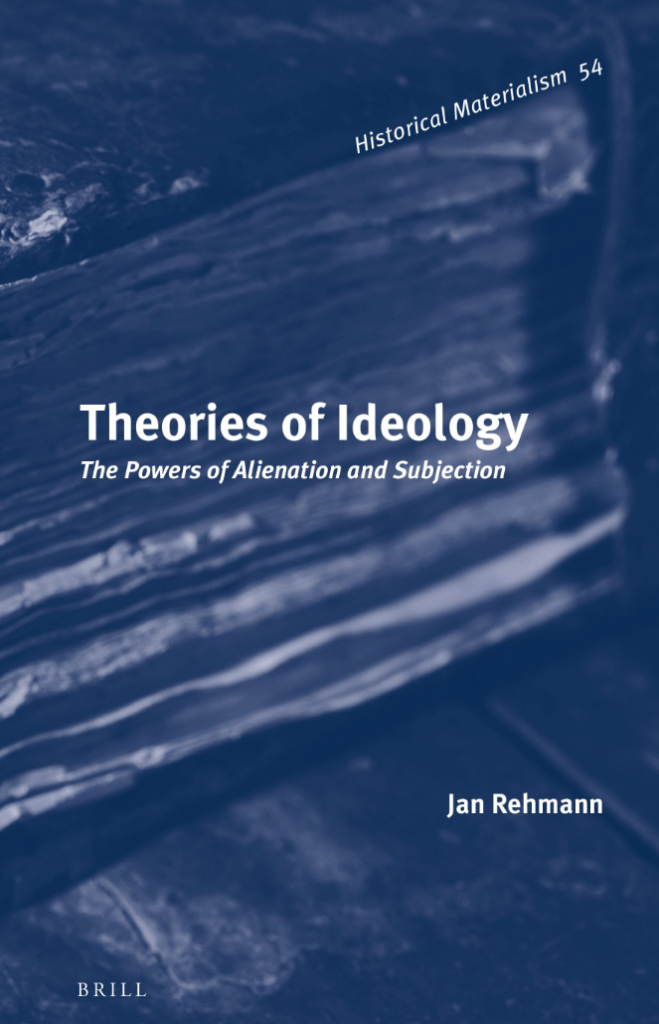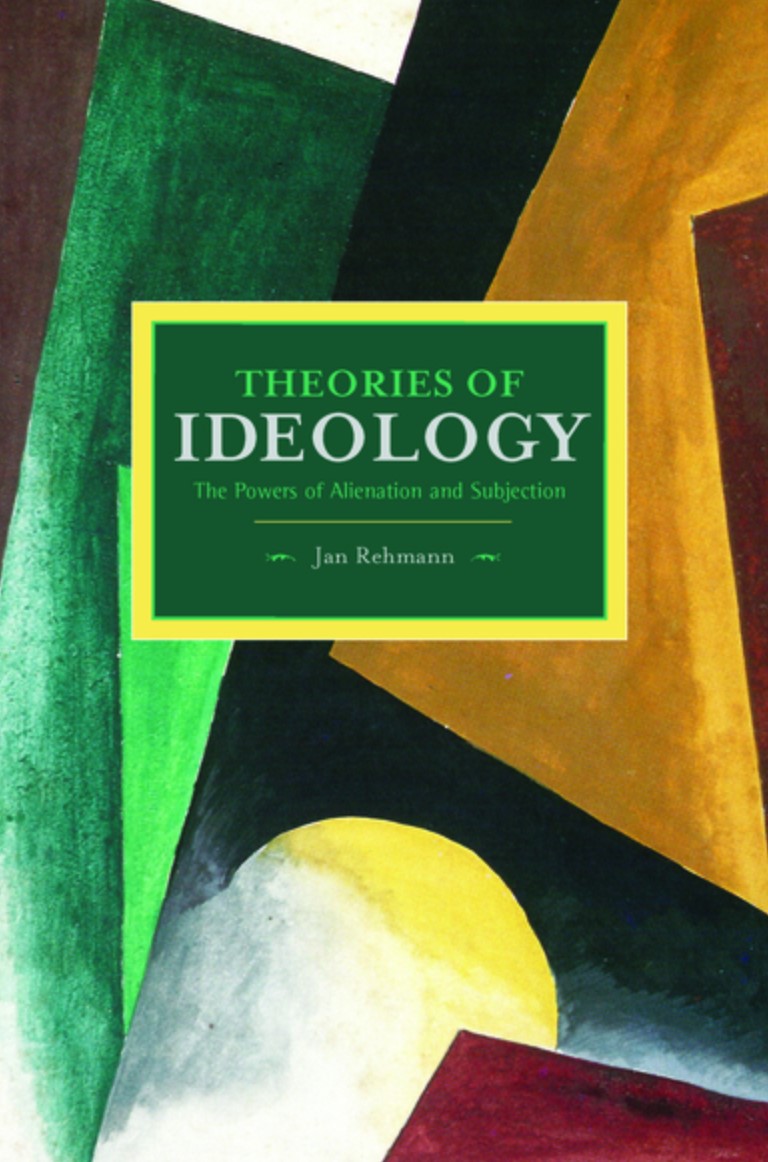Jan Rehmann, Union Theological Seminary (NY) & the Free University (Berlin)
How to explain the hegemonic stability of neoliberal capitalism even in the midst of its crises? The emergence of ideology theories marked a re-foundation of Marxist research into the functioning of alienation and subjection. Going beyond traditional concepts of ‘manipulation’ and ‘false consciousness’, they turned to the material existence of hegemonic apparatuses and focused on the mostly unconscious effects of ideological practices, rituals and discourses. Jan Rehmann reconstructs the different strands of ideology theories ranging from Marx to Adorno/Horkheimer, from Lenin to Gramsci, from Althusser to Stuart Hall, from Bourdieu to W.F. Haug, from Foucault to Butler. He compares them in a way that a genuine dialogue becomes possible and applies the different methods to the ‘market totalitarianism’ of today’s high-tech-capitalism.
Biographical note
Readership
Reviews
Thomas Klikauer (University of Western Sydney, Australia), Capital & Class 39(3): 550-554″[…] this book provides a good overview of the historical development of various major accounts of ideology, […]
Michael Morris, Marx & Philosophy“This book’s treatment is the best introduction we have to the complicated notion of ideology. It provides the most sophisticated yet subtle analyses of how hegemony operates in our time. Jan Rehmann has given us a marvelous gift.”
Cornel West, Professor of Philosophy and Christian Practice, Union Theological Seminary“Part of a larger movement of boldly reconceptualizing Marxism in and for the 21st century, Rehmann offers a philosophically self-conscious rethinking of ideology. Based on critical surveys of other important theories (especially those emerging from Gramsci and Althusser) he explores how and why ideology shapes society, how society shapes the conscious and unconscious parts of ideologies, and how this applies to current phenomena such as neoliberalism, the capitalist crisis since 2007, and the tea party movement.”
Richard D. Wolff, University of Massachusetts
“My own intellectual and political conviction is that we need the concept of ideology all the more urgently today, when its use has been stigmatized by contemporary philosophy. Rehmann’s book provides a detailed and indispensable account of its history, the various modern versions of the concept and the debates which have swirled around it: just what we need to make a new beginning!”
Fredric Jameson, Duke University
Table of contents
Introduction
1. Twisted preliminaries: the ‘Idéologistes’ and Napoleon
1.1. Ideology as a ‘natural science’ of ideas
1.2. A post-Jacobin state-ideology
1.3. Napoleon’s pejorative concept of ideology
2. Ideology-Critique and Ideology-Theory according to Marx and Engels
2.1. From ‘inverted consciousness’ to ‘idealistic superstructures’
2.2. The critique of fetishism in the Critique of Political Economy
2.3. Did Marx develop a ‘neutral’ concept of ideology?
2.4. Engels’s concept of ‘ideological powers’
3. The Concept of Ideology from the Second International to ‘Marxism-Leninism’
3.1. The repression of a critical concept of ideology
3.2. Lenin: bourgeois or socialist ideology?
3.3. Lenin’s ‘operative’ approach: self-determination and hegemony
3.4. Ideology in ‘Marxist-Leninist’ state-philosophy
3.5. ‘Ideological relationships’ in the philosophy of East Germany
4. The Concept of Ideology from Lukács to the Frankfurt School
4.1. György Lukács: Ideology as reification
4.2. Horkheimer’s and Adorno’s critique of the ‘culture-industry’
4.3. Abandoning the concept of ideology?
4.4 The ‘gears of an irresistible praxis’
4.5. Ideology as ‘instrumental reason’ and ‘identitarian thought’
4.6. From Marcuse to Habermas – and back to Max Weber?
4.7. Taking the sting out of critical theory
4.8. ‘Commodity-aesthetics’ as ideological promise of happiness
5. The Concept of Ideology in Gramsci’s Theory of Hegemony
5.1. A significant shift in translation
5.2. Gramsci’s critical concept of ideology
5.3. The critique of common sense as ideology-critique
5.4. Gramsci’s concept of ‘organic ideology’
5.5. ‘Ideology’ as a category of transition toward a theory of hegemony
5.6. The critique of corporatism and Fordism
5.7. A new type of ideology-critique on the basis of a theory of hegemony
6. Louis Althusser: Ideological State-Apparatuses and Subjection
6.1. The relationship to Gramsci
6.2. The theory of ideological state-apparatuses (ISA)
6.3. A debate on ‘functionalism’
6.4. ‘Ideology in general’ and subject-constitution
6.5. The derivation of the ‘imaginary’ from Spinoza and Lacan
6.6. Lacan’s universalisation of subjection and alienation
6.7. Can subjects talk back at interpellations?
7. From the Collapse of the Althusser School to Poststructuralism and Postmodernism
7.1. Michel Pêcheux’s discourse-theoretical development of Althusser’s ideology-theory
7.2. The post-Marxist turn of Ernest Laclau and Chantal Mouffe
7.3. Stuart Hall: Bridging the theory of hegemony and discourse-analysis
7.4. Michel Foucault’s neo-Nietzschean trajectory from ideology to discourse to power
7.5. Poststructuralism and postmodernism
8. Pierre Bourdieu: ‘Field’, ‘Habitus’ and ‘Symbolic Violence’
8.1. The development of the concept of field from the German Ideology
8.2. Field against apparatus?
8.3. Ideology, symbolic violence, Habitus – disentangling a confused arrangement
8.4. Bourdieu’s contribution to the development of Althusser’s model of interpellation
8.5. A new determinism?
9. Ideology-Critique with the Hinterland of a Theory of the Ideological: the ‘Projekt Ideologietheorie’ (PIT)
9.1. The resumption of Marx and Engels’s critical concept of ideology
9.2. The ideological at the crossroads of class-domination, state and patriarchy
9.3. ‘Vergesellschaftung’ – vertical, horizontal, and proto-ideological
9.4. The dialectics of the ideological: compromise-formation, complementarity and antagonistic reclamation of the common
9.5. Fascistic modifications of the ideological
9.6. Policies of extermination and church-struggle in Nazi Germany
9.7. Further ideology-theoretical studies
10. Friedrich Hayek and the Ideological Dispositif of Neoliberalism
10.1. The formation of neoliberal hegemony
10.2. Hayek’s frontal attack on ‘social justice’
10.3. Overcoming ‘economy’ by the game of ‘catallaxy’
10.4. Hayek’s construct of ‘negative’ justice
10.5. The religious structure of Hayek’s market-radicalism
10.6. A symptomatic contradiction between market-destiny and subject-mobilisation
10.7 State and liberty: neoliberal discourse is permeated by its opposite
10.8. The road to ‘disciplinary neoliberalism’
10.9. Is the hegemony of neoliberal capitalism exhausted?
11. The Unfulfilled Promises of the late Foucault and Foucauldian ‘Governmentality-Studies’
11.1. Foucault’s mediation of the techniques of domination and of the self
11.2. The enigmatic content of the concept of governmentality
11.3. Eliminating the inner contradictions of neoliberal ideology
11.4. A problematic equation of subjectivation and subjection
11.5. Towards an ideology-theoretical reinterpretation of ‘governmentality-studies’
Bibliography
Index


